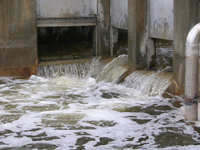At Last - A Canada-wide Strategy for Municipal Wastewater Management
 GLOBE-Net - it’s not a subject that makes headlines, but it affects the health and wellbeing of everyone in the country and comes at a $39 billion price tag.
GLOBE-Net - it’s not a subject that makes headlines, but it affects the health and wellbeing of everyone in the country and comes at a $39 billion price tag. Wastewater from households, industrial, commercial and institutional sources typically contains a broad range of substances that pose risks to human and environmental health. In some cases, urban runoff or storm water is collected with sanitary waste in combined sewers, adding different pollutants to wastewater and increasing the volume of water to be treated.
Treating wastewater before it is discharged to the environment reduces the risks posed to human and environmental health. Until now Canada lacked a national standard for the treatment of municipal wastewater,
currently managed through a variety of federal, provincial, territorial and municipal level policies, by-laws and legislation.
That changed last week with the endorsement of a Canada-wide Strategy for the Management of Municipal Wastewater Effluent by federal and provincial ministers of environment in Whitehorse on February 17, 2009, according to a Communiqué issued at the conclusion of the meeting.
The strategy sets out a harmonized framework to manage discharges from more than 3,500 wastewater facilities in Canada, many of which are currently in need of repair and upgrading. It provides an agreed-upon path forward for achieving regulatory clarity for owners of municipal wastewater facilities. Performance standards will increase protection for human health and the environment on a national basis. Bilateral agreements between the federal government and provinces and territories will ensure one-window regulatory delivery of the strategy.
A number of jurisdictions have endorsed the Strategy and are ready to begin implementation.
The Strategy includes minimum national performance standards to be achieved by all facilities and a process to develop and manage site-specific effluent discharge objectives. The minimum standards are equivalent to secondary treatment. The Strategy also outlines risk management activities to reduce the risks associated with combined and sanitary sewer overflows. High-risk facilities must meet national performance standards within 10 years; low risk facilities will have up to 30 years to comply.
The total cost over 30 years to implement the Strategy, including capital and non-capital costs, is at least $10 to $13 billion, depending on inflation. It is estimated that approximately 50 per cent of the estimated costs will be expended in the first 10 years of implementation, primarily to address high-risk facilities.
The initial cost estimates do not include all costs associated with implementing the Strategy, in particular those costs associated with managing combined sewer overflows and meeting site-specific Effluent Discharge Objectives.
The Strategy’s economic plan identifies that implementation of the Strategy is affordable if governments make wastewater infrastructure an investment priority. For many small and very small communities, with limited fiscal capacity, it will be a challenge to implement the Strategy without senior government assistance.
Use of full cost recovery and own-source financing tools will be encouraged to the fullest extent possible, keeping in mind the challenges of small and very small communities. Once the extent of these tools is determined, other complementary forms of funding could be sought from provincial and federal governments. Gas Tax and Building Canada Funds are also possible funding mechanisms to supplement funding needs for risk assessments and capital costs.
Environment Ministers also discussed a range of other issues including climate change, strategies to reduce packaging and encourage producers to take greater environmental responsibility for the products they manufacture, the development of a structured framework for discussions in the lead-up to the United Nations Climate Change Conference in Copenhagen in December 2009, and the future Canada-US discussions on climate change.
The Canada-wide Strategy for the Management of Municipal Wastewater Effluent is available for download as is information on Tools and Background Information.
You can return to the main Market News page, or press the Back button on your browser.

